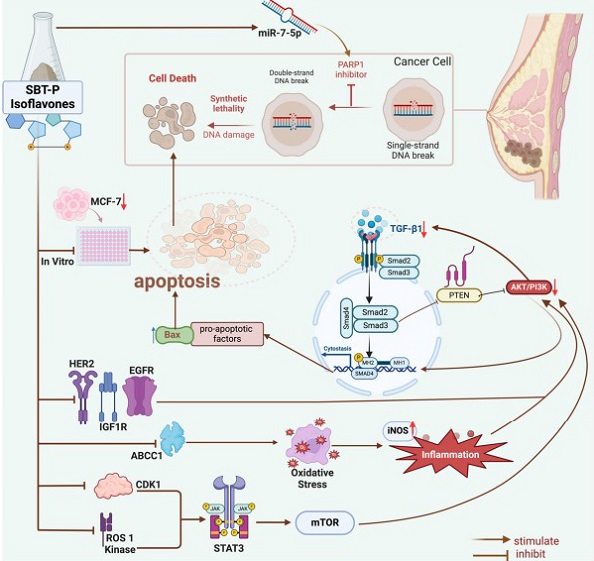Indonesian Study Finds Soy-Based Tempeh's Isoflavones Can Inhibit Breast Cancer Via miR-7-5p Upregulation
Nikhil Prasad Fact checked by:Thailand Medical News Team May 26, 2024 1 year, 8 months, 2 weeks, 3 days, 1 hour, 41 minutes ago
Cancer News: A Collaborative Effort in the Fight Against Breast Cancer
A groundbreaking study conducted by a consortium of Indonesian universities, including the State Islamic University of Sunan Kalijaga (UIN Sunan Kalijaga) in Yogyakarta, Hasanuddin University in Makassar, IPB University in Bogor, Atma Jaya Catholic University of Indonesia in Jakarta, Muhammadiyah Manado University, and Universitas Sam Ratulangi in Manado, in collaboration with Kyung Hee University in South Korea, has revealed promising findings in the battle against breast cancer. The study that is covered in this
Cancer News report, focuses on the isoflavones derived from soy-based tempeh and their potential role in inhibiting breast cancer via the upregulation of miR-7-5p, a microRNA known for its tumor-suppressive properties.
 Biomechanism of SBT-P and derived isoflavones in breast cancer pathway modulation.
Breast Cancer: A Global Health Challenge
Biomechanism of SBT-P and derived isoflavones in breast cancer pathway modulation.
Breast Cancer: A Global Health Challenge
Breast cancer remains a significant global health issue, with incidence rates rising worldwide. Current treatment methods, including chemotherapy, radiotherapy, and targeted therapy, while advanced, are not entirely effective in preventing or controlling the disease. The complexity of breast cancer, influenced by genetic, environmental, and lifestyle factors, demands innovative approaches and solutions.
The Promise of Functional Foods
Functional foods, particularly tempeh, have gained attention for their potential role in cancer prevention and treatment. Tempeh, a traditional Indonesian food made from fermented soybeans, is rich in bioactive peptides and isoflavones. These compounds exhibit antioxidant properties, induce apoptosis (programmed cell death), and inhibit cancer cell proliferation, making tempeh a promising candidate for breast cancer therapy.
Integrating Pharmacoinformatics and Cellular Studies
The study employs a multifaceted approach, integrating pharmacoinformatics and cellular investigations to elucidate the antioxidative and anti-breast cancer properties of tempeh-derived isoflavones. Methodologies include metabolomic profiling, in silico analysis, antioxidant assays, and in vitro experiments. The primary focus is on two key isoflavones: daidzein and genistein, both of which have shown potential therapeutic benefits against breast cancer.
Metabolomic Profiling: Unveiling Bioactive Compounds
Through advanced metabolomic profiling using UPLC-ESI-MS/MS, the researchers identified several bioactive compounds in soy-based tempeh powder (SBT-P), primarily phytoestrogenic soy isoflavones and mycoestrogenic compounds. Daidzein and genistein emerged as significant compounds with potential therapeutic effects, demonstrating strong antioxidant and anticancer activities.
In Silico Analysis: Predicting Efficacy and Safety
The study's in silico analysis involved network pharmacology and molecular docking simulations to predict the efficacy and safety of SBT-P isoflavo
nes. The compounds showed favorable Pa scores, compliance with the Lipinski Rule, and high affinity values for specific cancer-related signaling proteins. Key regulators identified include STAT3, EGFR, IGF1R, CDK1, ABCC1, TGFBR1, and PARP1, which are crucial in cancer signaling pathways.
Antioxidant Assays: Measuring Radical Scavenging Activity
Antioxidant assays, specifically ABTS and FRAP, were conducted to measure the radical scavenging activity of SBT-P and its isoflavone derivatives. Results indicated that SBT-P and daidzein exhibited better antioxidant potential than the control (trolox), suggesting their efficacy in neutralizing free radicals and preventing oxidative stress, a key factor in cancer progression.
In Vitro Experiments: Confirming Anti-Breast Cancer Effects
In vitro experiments further confirmed the anti-breast cancer effects of SBT-P and its isoflavone derivatives. The study demonstrated a significant downregulation of breast cancer signaling proteins and an increased expression of miR-7-5p in treated cells. miR-7-5p is known for its tumor-suppressive properties, and its upregulation suggests a potential mechanism through which SBT-P exerts its anticancer effects.
Safety Profile: Minimal Cytotoxic Effects
An important aspect of the study was assessing the safety profile of SBT-P and its isoflavone derivatives. The LD50 values on normal breast cell lines (MCF-10A) indicated minimal cytotoxic effects, suggesting that SBT-P could be a safe therapeutic option for breast cancer treatment. This finding is crucial as it underscores the potential for these compounds to be used in clinical settings without causing significant harm to normal cells.
Discussion: Bridging the Gap in Cancer Research
The study's findings bridge a significant gap in cancer research by integrating the antioxidative and anticancer mechanisms of tempeh-derived isoflavones. The comprehensive analysis highlights the multifaceted engagement of SBT-P in various cancer pathways, emphasizing the need for further research and clinical trials to explore their full therapeutic potential.
Conclusion: A Step Towards Effective Breast Cancer Therapy
This extensive study underscores the potential of soy-based tempeh and its isoflavones, particularly daidzein and genistein, in managing breast cancer. By combining in silico, in vitro, and metabolomic analyses, the research provides valuable insights into the therapeutic and safety profiles of these compounds. The findings pave the way for further clinical exploration and the development of functional foods as effective therapeutic interventions in the fight against breast cancer.
Future Directions
The promising results of this study warrant further investigation into the clinical efficacy of SBT-P and its isoflavone derivatives. Future research should focus on clinical trials to validate these findings and explore the potential of integrating tempeh-derived isoflavones into standard breast cancer treatment protocols. Additionally, understanding the bioavailability and pharmacokinetics of these compounds will be crucial in optimizing their therapeutic use.
In summary, this collaborative study offers a beacon of hope in the ongoing battle against breast cancer, highlighting the potential of natural, food-based solutions in providing safe and effective treatment options.
The study findings were published in the peer reviewed journal: Antioxidants.
https://www.mdpi.com/2076-3921/13/6/632
For the latest
Cancer News, keep on logging to Thailand Medical News.
Read Also:
https://www.thailandmedical.news/news/alzheimer-s-disease-study-shows-tyrosine-proline-dipeptide-derived-from-soy-can-reduce-memory-impairment-in-mice-
https://www.thailandmedical.news/news/herbs-and-phytochemicals-daidzein-and-genistein-from-soyabeans-and-equol,-a-gut-flora-metabolite-from-daidzein-can-help-in-prostate-cancer
https://www.thailandmedical.news/news/menopause-news-american-study-finds-that-low-fat-vegan-diet-with-soy-decreases-hot-flashes-by-95-percent
https://www.thailandmedical.news/news/study-shows-that-the-phytochemical-calycosin-extracted-from-red-clover-and-astragalus-propinquus-plants-can-help-prevent-breast-cancer-metastasis
https://www.thailandmedical.news/news/a-diet-with-less-foods-that-contains-sulfur-amino-acids-such-as-meat-and-soy-proteins,-lowers-risk-for-cardiovascular-disease
https://www.thailandmedical.news/news/new-study-confirms-soybean-oil-is-unhealthy-and-it-causes-genetic-changes-in-the-brain
